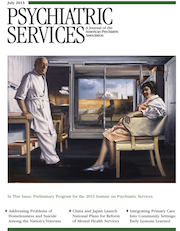To the Editor: It has long been recognized that rates of suicide in many countries are higher among physicians than in the general population. Rates that are from 40% to 130% higher have been documented (
1). However, the topic has received little attention in the literature.
In the wake of the recent loss of a colleague to suicide, we conducted a comprehensive review of the literature on how health care institutions have responded to staff suicides. We hoped that the literature would point us toward supportive interventions for staff in other settings that we could consider implementing.
Our review addressed the following question: How have health care institutions responded to staff suicides? Health care workers of all types were considered. Only studies of suicide were included, and articles on related topics, such as depression, burnout, and the use of mental health services, were excluded. Databases searched included EMBASE, MEDLINE, PsycINFO, OvidSP, Google Scholar, Scopus and HealthSTAR. All study designs were included, and electronic databases were searched from 1946 through August 2012.
The results revealed a scarcity of research on the topic. We found only three articles that met our inclusion criteria: a consensus statement published by the American Foundation for Suicide Prevention (
2) and two qualitative studies that aimed to understand the reactions of staff to the suicide of a colleague (
3,
4). On the basis of the authors’ documented experiences, suggestions were made for possible supportive interventions for staff, such as bereavement group therapy and provision of 24-hour phone contact (
2). All three articles emphasized the need for supportive measures to be provided to staff, as well as the need for further research. A number of other researchers have also verified the lack of research on the topic (
5).
In light of the lack of data, we repeated our review, expanding it to include other, non–health care workplaces (for example, schools) to determine how the suicide of a staff member has been dealt with in other settings. We thought that lessons learned in other settings could be used by health care institutions. However, no articles met the inclusion criteria described above.
We hoped that our review would direct us toward helpful interventions to implement in our own institution. We were disappointed to find that the literature was not able to offer much in the way of guidance. We hypothesize that this is a difficult area to study because of the suddenness and shock of the loss of a colleague to suicide. Staff struggles in the aftermath and negative outcomes, such as difficulty providing patient care, have been documented (
3). We hope that illuminating the crucial need for attention to this issue will promote interest in undertaking a critical examination of this important topic.
Acknowledgments and disclosures
The authors thank David Lightfoot, M.I.St., Ph.D., for assistance with the literature review.
The authors report no competing interests.

